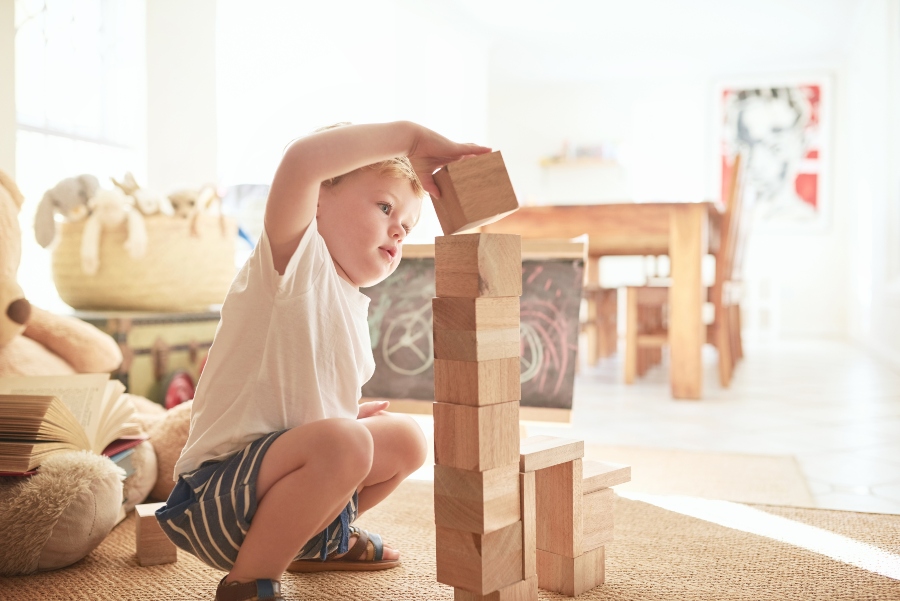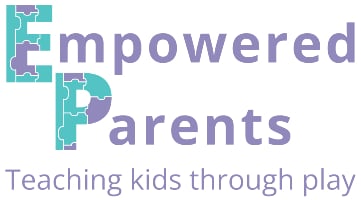What is the role of play in cognitive development? Is it really that important for developing intellectual skills?
Play is my favourite topic to write about. Not only do children come alive when they play, but they also learn more than you can imagine.
While seeing a child sitting at a desk with a pen and paper may look more like traditional “learning”, the real magic is happening during play.
There is a lot of in-depth research about play and brain development, but I’d like to share a simple explanation of some of the cognitive benefits of play in child development.
These are based on my own experience in the classroom, but some are also taken from the book “The Young Child in Context: A Psycho-Social Perspective“, written by Marike de Witt.
1. Learning About the World
Play is the primary way children learn about and discover the world. Play can take the form of anything from a baby trying to discover what a block is by putting it in his mouth, to a 5-year-old pretending to be a fireman, rescuing people in danger.
2. Solving Problems
Learning an important life skill such as problem solving is not easily taught or explained to a child.
The best way to develop this skill is to have real-life problems to solve, and there’s no better time to do that than during play.
Here are just a few examples of challenges and obstacles that could arise:
- Building a castle – with blocks – that keeps falling over
- Finding something that can be used as a bridge to walk over, to avoid falling into the “lake of crocodiles”
- Resolving a conflict when more than one child wants to be the “mom” in the game
- Finding the correct ratio of sand to water so that a perfect “cupcake” can be turned out of a cup
3. Cause and Effect
Cause and effect can be explained as “when I do this, that happens”, or rather “actions have consequences.”
A young child might throw their favourite teddy bear into the bath in protest, and then be devastated that it isn’t dry in time for bedtime. An older child might hold back from putting a paintbrush into the wrong pot, or the paint colours will change.
Play gives children a platform to experiment with “doing things” and discover that most actions have consequences. With maturity, they learn to think carefully before acting as they are better able to predict the outcome.
4. Cognitive Skills
There are many mental skills that kids learn during play, such as grouping (sorting), finding common relations (or spotting the odd one out), ordering and sequencing. They also learn concepts such as time and space.
These can be learned while playing with blocks, cards, cognitive games, peg boards, and many other activities.

5. Perceptual Skills
Auditory perception and visual perception help the brain to make sense of and interpret what the child sees and hears. This helps with all future academic skills.
6. Language
While children interact with caregivers, peers and their environment, they develop receptive and expressive language (first they passively learn to understand language, then they start to use it).
Play is how children build a vocabulary and learn language structures such as sentence structure, grammar and so on.
Through language, kids also develop communication skills.
7. Listening Skills
Listening goes hand in hand with language and is arguably one of the most crucial life skills. Rather than listening as “behaving,” I am referring more to listening for information, understanding instructions and being able to evaluate what is heard.
During activities such as listening to stories, playing games with simple rules, reciting rhymes and engaging in pretend play with others, children can develop listening skills.

8. Fantasy vs Reality
It is during play that children learn the difference between fantasy and reality. The more knowledge they acquire and the more they grow and develop, the better they are able to tell the two apart.
It can take years before they are mature enough to understand that a wand doesn’t have magic in it, or dragons are fictional.
9. Critical Thinking
The more children engage with their environment and make sense of the world through play, the more they develop the ability to think critically and form opinions, use reason and evaluate circumstances.
Kids learn higher-order thinking skills – as laid out in Bloom’s Taxonomy – such as remembering, understanding, applying, analysing, evaluating and creating.
These are not the kind of skills you can teach out of the blue in a class in primary or high school. Rather, they need to be learned in practice and with real-world application.
10. Attention Span
The easiest way to build a child’s attention span is to allow them the space to get deeply involved in their play – such as during fantasy play, creating something or building a puzzle.
The more they persevere and get lost in the moment, the more they stretch their attention span naturally.

11. Memory
Children build their memory over time through play. Two aspects of memory – visual memory and auditory memory – are important for reading, writing and maths.
They can be built through simple play activities such as matching card games, reciting rhymes, listening to stories, etc.
12. Planning Skills
Children use planning skills during their schooling years in many ways – planning the setout of their project, planning their study timetable, etc.
During the learning through play years, they start to learn this skill in practice.
For example, a child who is still learning to plan might set out to draw their family but then run out of space on the page because the mom and dad are too large. As they learn to plan, they will start their drawing with the end goal in mind, by spacing the people on the page carefully.

13. Early Maths and Science
Children pick up early maths and science concepts during cooking, reciting counting rhymes, sand and water play, block play and more.
The opportunities to experiment and discover are everywhere.
14. Initiative
Real play – that is child-led and not directed by adults – can be a great way for children to develop initiative and take control of their experiences.
Children who are left to be “bored” are given an opportunity to use their imagination and learn to think for themselves.
15. Practising Ideas and Concepts
Children usually act out the world as they see it in an attempt to try to make sense of it. Remember it is all new to them!
A child who visits the dentist may start to role play as a dentist at home, or play teacher-teacher while handing out some harsh discipline to dolls in an attempt to learn about acceptable behaviour.
Almost everything children perceive and learn about will show up in their play at some point.
I hope you’ve enjoyed reading these examples of cognitive development through play.
Read more about the physical benefits of play, social benefits of play and emotional benefits of play.

